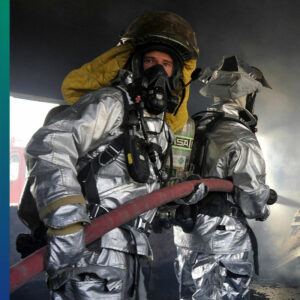
“Medical care for the elderly lags substantially behind in most Western countries.” Already in 2007, the Dutch professor of internal medicine and gerontology Rudi Westendorp made this claim in one of his famous lectures.
Westendorp advanced two arguments to prove medical care for the elderly lags behind. The first was that the medical protocols prevented a more coherent approach of the elderly. His second argument was that people over 65 were consistently excluded from medical research.
Unfortunately, in The Netherlands, Westendorp’s wake-up call fell on deaf ears. Shortly afterwards, he moved to Denmark. If the current pandemic proves anything, it is indeed that Westendorp was right and that medical care for the elderly lags behind.
Some of the links are affiliate links. As an affiliate associate, we earn a commission when you purchase any of the products offered through the shared links at no extra cost for you. This helps us maintain this website.
Table of contents
- 1 The welfare state abandoned the elderly
- 2 Painful muscle contractions, a cough, and a headache
- 3 Wars aren’t won by vaccinations
- 4 The big catastrophe: the medical care for the elderly
- 5 Who’s going to save the planet?
- 6 The pandemic is not predesigned
- 7 Why are we winning the battle and losing the war?
- 8 Our future is not predesigned
- 9 Our freedom comes with a lot of responsibility
- 10 The challenge is to navigate on our compass of trust
The welfare state abandoned the elderly

For me, one of the most confusing aspects of the current pandemic is that every step I take outside the house is determined by it. We have to wear masks all the time when outside on the streets or in a shop.
Even when I leave the house virtually, on Facebook, or talk with friends on Whatsapp, it’s all about the pandemic. The media only talk about 2 things: the virus and sports. The first you can get, the second you can’t visit.
The least you could say is that these are interesting times. It also points at the value of life: our own health, family, and a functioning welfare state. This last value, a functioning welfare state, is exactly where Westendorp’s claim refers to: the welfare state has abandoned the elderly.
Painful muscle contractions, a cough, and a headache
To prevent individual suffering is supposed to be at the core of the medical care of the welfare state. Efforts to control the covid-19 virus hopelessly failed and are still failing specifically when it comes to medical care for the elderly.
Iceland is the only country that has made the right choices. Their healthcare systems were all aimed at preventing suffering. And they statistically controlled the course of the pandemic. Hardly anybody died of the virus in Iceland.
They also concluded that fever is no symptom of the virus. The main symptoms are painful muscle contractions, combined with a cough, and a headache.
Wars aren’t won by vaccinations

“Wars aren’t won by evacuations,” Winston Churchill told the House of Commons on June 4, 1940. In the few days preceding these words, some 335,000 soldiers were successfully evacuated from the beaches of Dunkirk and out of the claws of the approaching German army.
Churchill must have known that England already lost a war in the 18th century when George Washington made evacuations his main strategy during the Revolutionary War. The war that separated the USA thoroughly from England.
Are vaccinations now the main strategy in the battle against the virus? Is this the best way to get back to the old normal as soon as possible? What comes next? Another virus? Another vaccine? Are we finally going to lose the attacks on our immune system?
The big catastrophe: the medical care for the elderly

One of the most confusing aspects of the current pandemic is that Hannie and I don’t know anybody with the virus. Yes, we know somebody, who knows somebody, who knows somebody, who they think contracted the virus and are at home and have some trouble to get started again.
At some point, I got rather frustrated with the stories and pictures in the media. These only add to the already burning fears of the elderly. How vulnerable are we? How can we contract the virus? When are we up for vaccination? How risky is the vaccine? And they are right to be anxious.
As a result of the neglect of medical care for the elderly, we’re heading towards a big catastrophe with warp speed. This is illustrated with the total lockdown of the world. There is no alternative for the lockdown, the masks, and all the other restrictions. All health care systems will be overcharged when we don’t comply. And all frail and vulnerable elderly will die.
Who’s going to save the planet?

Bill Gates is a brilliant man. And with him many of his billionaire colleagues. In business, they are brilliant. And in achieving their wealth. At the same time, their brilliance is limited to their personal goals. What really needs to be done on this planet, has to be done by us.
We, the tax-paying and law-abiding citizens determine our future. In this, for me, the frontline workers are far more inspiring than Bill Gates or any of his colleagues. They do their duty, despite the enormous personal risks.
And despite the fact that every day all the appreciation goes to the likes of Bill Gates. Frontline workers know that the handful of billionaires will not save the planet. But even the frontline workers will not be able to improve the medical care for the elderly.
The pandemic is not predesigned
One of the biggest lies that circles around on the Internet is that the pandemic is predesigned. However, there’s no logic in launching a virus that kills frail and vulnerable people. A virus causing the economy to collapse. The world to get in total lockdown.
Of course, the virus might have escaped from a laboratory. It wouldn’t have been the first time. Yet, these escapees are human mistakes. Viruses don’t escape out of human design. Although it would have been nice if the pandemic had been fought with more human design.
With the battle against the virus, we could’ve been on a far better track. We could have fared much better when from the start of the pandemic, like in Iceland, everybody concentrated on the end of the pipeline. A strategy aimed at those who are most affected, the frail and vulnerable elderly. Now it’s too late for that.
Why are we winning the battle and losing the war?

There are two examples of the way we could have fared better. The first is the development of a vaccine. And next, the medical care for the elderly. With a bit of luck, there are five types of vaccine.
However, at least another 55 types have been officially announced. Wasn’t one vaccine enough?
Moreover, why a vaccine? The vaccination of 7 billion people is a logistical nightmare. Why didn’t they design a pill? Or a capsule? These would have been easier to produce and easier to distribute.
Next, where is the vaccine, or the medication, or the therapy to cure those frail and vulnerable elderly. The elderly who contracted the virus, who got so terribly sick of it, and who died from it in horrific circumstances. Why are there so many companies working on the virus and not on the cure of those affected?
Our future is not predesigned
“After The Plague Came The Renaissance”. This text is written on the front of a boarded-up building in Santa Monica, California (USA). Of course, it’s not true. The plague raged on until almost the end of the 19th century. By that time the Renaissance was already over. However, the meaning of the text is obvious. It is to uplift the spirits of the millions who suffer from the pandemic.
At present, “After The Virus Comes The Old Normal” seems to be the slogan to uplift the spirits for most of us. Although some hope for ‘the new normal’, regrettably I must say that ‘the old normal’ is the current norm.
‘We must practice what we preach’ is a beautiful principle. It would, however, be nice if more people would preach something else. For instance, preach about a more sustainable lifestyle and practice it. At the core of this lifestyle should be a better relationship with our fellow human beings and our environment. Our future is not predesigned, what we practice is decisive.
Our freedom comes with a lot of responsibility

With our future, it’s as with wearing a mask. Everybody can decide to wear a mask or not. But does wearing a mask affect our freedom? Does the lockdown affect our freedom? And vaccination? The thing with freedom is that it comes with all kinds of risks. We don’t like most of those risks. Our entire society is equipped to prevent such risks.
However, not when it comes to medical care for the elderly. We have abandoned them in a terrible way. Is this the way we allocate the responsibility for our freedom? Are we only responsible for ourselves? When this was true nobody would dare to go out in the traffic. Not even with a car. How could we be sure that everybody would stop at a red traffic light? How could we ever be sure our food is safe? Or our drinking water?
Our freedom goes as far as we trust others to exercise their freedom with caution, with regard for the rules that guide our freedom, and with respect for the life and livelihood of others.
Sometimes our trust in others is challenged because the stakes are higher than we’re used to or would prefer. For instance when our life is at stake. As is now the case with the virus. This is why it’s important we fight for the victims of the pandemic. Predominantly the elderly.
Of course, the virus and the battle against the virus come with tremendous uncertainties. How do we cope with such uncertainties? Are we safest when we do nothing? When we stay at home and don’t eat and drink anything? Because we never know what might happen? Of course not. These are not serious options for us. For nobody.
What we all try to do at the moment is to navigate on our own compass of trust. The beauty is that this gives us all the freedom available. Available at the moment. Tomorrow the challenge, and with the challenge our freedom, might open up totally new perspectives. We might as well enjoy and cherish these different perspectives of freedom. For now and for tomorrow.
How do you appreciate the medical care for the elderly? Please let us know in the comment box.




Hi Tom, Again, a brilliant article! Thank you very much!
I am a frontline worker, and even though I am a nurse, I’m not too fond of the health care system we have. We give medications instead of working on reaching out and inform people to change their lifestyle and take on their own responsibility for their health. I take care of elderly patients and chronically ill ones, so I can say there is little information preventing illness. But the worse thing I notice is that people still hide behind their doctors’ backs, not willing to take care of themselves. It is an overwhelming situation, and it will not be a fast process of changing the system. Maybe because the elderly are the children of the 2nd world war and not interested in living a sustainable lifestyle. They are too old, and their past has become their world. But the younger people have to be informed to help save this planet and change their lifestyles. I believe anyway that this is the future, a sustainable form of life. People have to rethink the system, and what you said already, we are the ones who need to change the system. It will not come from the people like Bill Gates, who are only interested in becoming wealthier. Actually, throughout history, we see that the people of a country need to get up. Still, there is so much confusion, and so many different interests, that this is nearly impossible.
Medical care has to change! I know this already for decades, trying to break out of a medical care system that is not effective. I like Iceland’s approach, preventing illness and of Sweden, which refused to go into lockdown.
Luckily we had no Covid infection among our clients and nurses, but when someone has a cough or fever, he/she needs to get tested and is not allowed to work, which puts a strain on the others who have to overwork.
That puts a toll on our immune system, and we are more vulnerable to all kinds of viruses and pathogens. I would love to see people strengthening their immunity instead of weakening their bodies. I am thankful for the internet and social media so that we can connect with like-minded people.
Tom, your work is outstanding! We need more people like you trying to spread vital information to reach out to people’s minds. Thank you very much!
Hi Sylvia,
Thank you again for your comment and generous compliments.
The paradox is, Sylvia, that the ‘frontline workers’ work at the ‘end of the pipeline’. Bus drivers must trust that the bus they drive has been designed in a proper way. They have to trust that the engine of their bus doesn’t explode, as the first designed steam engines did. The bus driver has the responsibility to drive save, yet at the same time he or she has to watch the schedule. A schedule which is designed by someone else. Garbage collectors have to trust the public not to stuff dangerous substances in their garbage bags. Garbage is really at the ‘end of the pipeline’!!! Nurses have to trust that the medical supplies, techniques, and machines they use are safe. They also have to trust that the citizens pay their health insurances every month, so they can be paid monthly.
In modern times we depend on the acts and minds of so many people. We hardly are able to separate the beginning from the end of the pipeline. This is why nobody can walk away from his and her responsibility.
With all the interdependencies we have to face several things happen with us. Some of us consistently hide behind others. Some of us hide their head in the sand. Some of us try to become independent. Some of us fight dependencies head-on. Some of us try to profit from others. Some of us cherries all the dependencies and are happy with them. Most of us do some of these things, some of the time. That’s who we are as humans. We’re not perfect. We don’t even like perfect people. We’re messy, and sloppy, and sometimes even nasty.
I think our public care system is what is possible at the moment. I know that all those who work in the public care system are burdened by their responsibility and do their utmost. Improvements are always possible. And the professionals must pursue them. At the same time it would be nice if more citizens would feel and act more responsibly when it comes to the public care system. Is this going to happen? Not in our lifetime I’m afraid. Not because they perhaps wouldn’t want to, but because they’re not aware they’re needed.
Humans are very interesting and we should try to understand them. Perhaps the more so in their failures. From these failures we perhaps can learn what we can improve ourselves.
Have a nice day. Stay safe, stay healthy.
Tom
Hi, totally true. Here in Croatia, we have an excellent medical system. At least when it comes to paying medical fees, etc. Almost everything is free in the state hospitals. However, the waiting line for some important things such as EEG is too big.
I had shoulder surgery recently and was waiting in line to get an appointment for physiotherapy; they told me to come back in 5 months…
And there was one old lady before me. She told them that her heart didn’t beat normally, and the guy made an appointment for over 12 months… That day, I was thinking, “God, she could die 10 times before they go to check if she is alright”.
So, yes, medical care for the elderly isn’t good and should be improved as soon as possible. If you don’t pay a lot of money, the system doesn’t care.
Hi Petar,
Thank you for your comment. Reading your comment I’m very aware that the differences are huge between countries such as Croatia on the one hand and for instance The Netherlands and Spain on the other.
Where I wrote about highly specialized medical care problems of the elderly, such as those caused by comorbidity (the occurrence of more than one impairment at the same time), the problems in your country are of a more basic type.
Your country lacks even the core institutional capacity to counter waiting line problems in medical care. In The Netherlands and Spain, there are hardly any such waiting lines. Even now during the pandemic, everybody who needs and wants immediate medical care can get it.
It’s hard to say what can be done to improve the situation in your country. At least, what can be done that you and most of your countrymen haven’t thought of yourselves. The problem is not a lack of ideas, but a lack of institutional capacities. Given the political priorities in your country at the moment, expanding these capacities is not to be expected soon, I’m afraid.
For now, stay safe, stay healthy.
Regards,
Tom